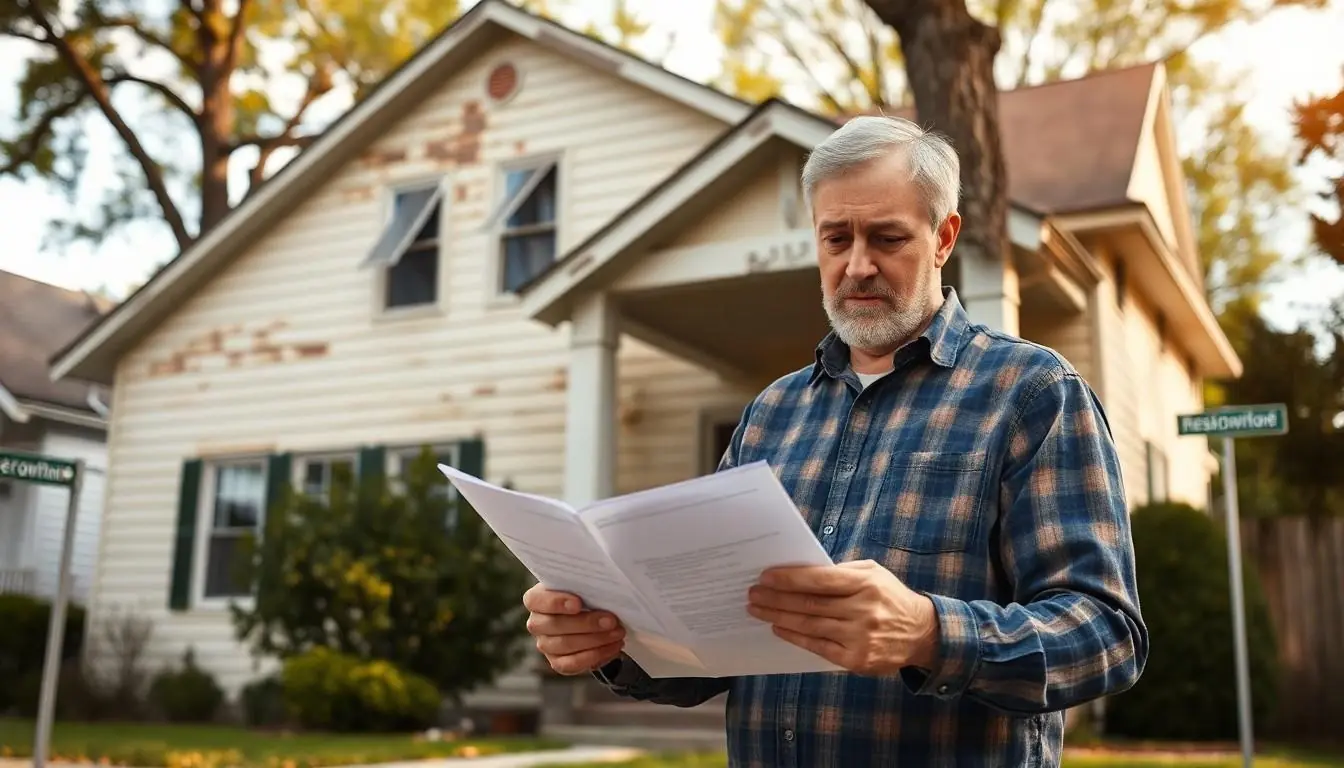Imagine finally settling into your dream home, only to find out that your homeowners insurance application has been denied. It’s like being told you can’t enter the party because you forgot to wear pants. While it might feel like the end of the world, there’s a silver lining. Understanding what happens next can help turn that frown upside down.
Table of Contents
ToggleUnderstanding Homeowners Insurance
Homeowners insurance provides financial protection for various aspects of a home. Coverage typically includes damage from events like fire, theft, and certain natural disasters. Policies also protect personal belongings and liability for accidents occurring on the property.
A variety of homeowners insurance types exist, each offering different levels of protection. Basic policies cover essential structures and belongings, while comprehensive options encompass a broader range of risks. Factors impacting coverage include the home’s age, location, and specific attributes such as security features.
Understanding the reason behind a denial is crucial. Insurance companies assess risks based on various data points. Prior insurance claims, property conditions, and even credit history can influence their decision-making process. It often helps to request a written explanation detailing the denial reasons. This information can guide homeowners in addressing specific issues leading to the denial.
Obtaining alternative coverage might require effort. Some insurers specialize in high-risk properties or offer specific policies for unique situations. It might also be beneficial to consider government-backed options or programs designed for individuals facing challenges acquiring standard insurance.
Seeking assistance from an insurance agent often provides valuable insights. Agents can suggest strategies to improve a home’s insurability. They can also recommend adjustments to existing policies to enhance coverage.
Understanding homeowners insurance means recognizing its importance and navigating potential obstacles effectively. With the required knowledge and resources, homeowners can achieve adequate protection for their properties.
Reasons for Denial

Understanding reasons behind a homeowners insurance denial is essential for addressing the situation effectively. Various factors contribute to these decisions.
Common Denial Reasons
Insurers often decline applications due to specific issues. A poor credit score can signal financial instability, leading to rejection. Unresolved claims history, particularly frequent claims or prior denials, raises red flags for insurers. Properties in areas prone to natural disasters or high crime rates attract scrutiny. Additionally, inadequate property conditions, such as missing safety features or structural issues, can prompt a denial. Applicants should review these common reasons to better understand their situation.
Risk Factors Considered by Insurers
Insurers evaluate multiple risk factors during the underwriting process. The age of a home significantly impacts it’s insurability; older homes often face higher risks. Location plays a critical role since certain regions have notable natural disaster frequencies. A home’s condition affects risk assessments, as poor maintenance can lead to potential hazards. Finally, the house’s proximity to fire departments or emergency services influences the decision. By recognizing these risk factors, applicants can take steps to improve their chances of securing coverage.
What Happens If You Are Denied Homeowners Insurance
Facing a homeowners insurance denial can lead to several immediate and long-term challenges. Understanding these impacts is crucial.
Immediate Effects on Homeowners
Immediate stress and uncertainty emerge when homeowners learn of their insurance denial. Many find they can’t secure a mortgage without adequate coverage. Financial losses may occur if damage strikes before alternative insurance is established. Homeowners may face difficulties in getting approved for new policies due to perceived risks. Increased premiums often appear for those seeking coverage after a denial. Lastly, homeowners must navigate conversations with mortgage lenders to maintain property financing.
Long-Term Consequences
Long-term impacts can significantly affect homeowners’ finances and property values. Elevated insurance rates commonly result from previous denials, leading to higher overall costs. Potential buyers may perceive a property as high-risk after a denial, potentially reducing its market value. Homeowners may grapple with difficulty accessing affordable insurance options as a result of this history. Additionally, claims history could be stained, causing problems in securing future coverage. Ultimately, homeowners need to address underlying issues to prevent future insurance challenges.
Options After Being Denied
Next steps become essential after receiving a homeowners insurance denial. Homeowners have several paths to consider for securing needed coverage.
Seeking Alternative Insurers
Specialized insurers often cater to high-risk properties. These companies might offer tailored coverage that meets unique needs. Local insurance agents maintain connections with various providers and can recommend suitable options. Homeowners should compare quotes to find the best rate and terms. Understanding policy details ensures informed decisions are made before committing.
Exploring State-Backed Programs
State-backed programs provide options for those struggling with traditional coverage. Many states offer plans designed to protect high-risk homeowners, helping them secure necessary insurance. Applicants must meet certain criteria to qualify for these programs. Resources like state insurance departments can offer valuable information regarding available options. Participation in such programs often leads to benefits like lower premiums and increased security during adverse situations.
Preventing Future Denials
Homeowners can take proactive steps to prevent future denials of insurance applications. Understanding and addressing specific risk factors significantly enhances insurability.
Improving Your Home’s Insurability
Homeowners should prioritize necessary repairs and upgrades to their properties. Updating the roof can minimize risks associated with leaks and damage. Installing modern electrical and plumbing systems enhances overall safety. Regular maintenance of HVAC systems helps to ensure optimal performance. They can also improve the property’s exterior by addressing landscaping issues, as overgrown vegetation may pose fire risks. Ensuring adequate security features like deadbolts and alarm systems may lower vulnerability to theft. Focusing on these enhancements creates a stronger application for future insurance requests.
Maintaining a Good Credit Score
Credit scores play a vital role in insurance approval. Homeowners need to monitor their credit reports regularly to identify errors and address them promptly. Paying off outstanding debts and credit cards lowers credit utilization ratios. Making timely payments consistently affects overall credit health positively. He or she could consider using credit monitoring services for real-time updates. Additionally, seeking advice from financial professionals on managing credit can provide valuable insights. Prioritizing these practices can result in better insurance options and lower premiums in the future.
Facing a denial for homeowners insurance can feel overwhelming but it’s essential to remember that options exist. By understanding the reasons behind the denial and taking proactive steps, homeowners can improve their chances of securing coverage. Whether it’s seeking alternative insurers or making necessary property upgrades, each action taken can lead to better outcomes.
Maintaining a good credit score and addressing property conditions are vital strategies for enhancing insurability. With the right approach and resources, homeowners can navigate these challenges and ultimately find the protection they need for their dream home.


